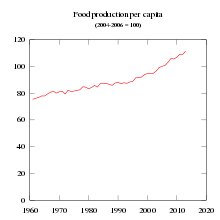
Peak wheat is the concept that agricultural production, due to its high use of water and energy inputs,[1] is subject to the same profile as oil and other fossil fuel production.[2][3][4] The central tenet is that a point is reached, the "peak", beyond which agricultural production plateaus and does not grow any further,[5] and may even go into permanent decline.
Based on supply and demand factors for agricultural commodities (e.g., changing diets in the emerging economies, biofuels, declining acreage under irrigation, growing global population, stagnant agricultural productivity growth),[6] some commentators between 2007 and 2009 predicted a long-term annual production shortfall of around 2% which, based on the highly inelastic demand curve for food crops, could lead to sustained price increases in excess of 10% a year – sufficient to double crop prices in seven years.[7][8][9] However, at that time according to the World Resources Institute, global per capita food production had been increasing substantially for the past several decades.[10]
- ^ IFDC, World Fertilizer Prices Soar, "Archived copy" (PDF). Archived from the original (PDF) on 2008-05-09. Retrieved 2009-03-03.
{{cite web}}: CS1 maint: archived copy as title (link) - ^ "Investing In Agriculture - Food, Feed & Fuel", Feb 29th 2008 at
- ^ "Could we really run out of food?", Jon Markman, March 6, 2008 at http://articles.moneycentral.msn.com/Investing/SuperModels/CouldWeReallyRunOutOfFood.aspx Archived 2011-07-17 at the Wayback Machine
- ^ McKillop, Andrew (2006-12-13). "Peak Natural Gas is On the Way - Raise the Hammer". www.raisethehammer.org. Retrieved 2022-09-15.
- ^ Agcapita Farmland Investment Partnership - Peak oil v. Peak Wheat, July 1, 2008, "Archived copy" (PDF). Archived from the original (PDF) on 2009-03-20. Retrieved 2008-07-24.
{{cite web}}: CS1 maint: archived copy as title (link) - ^ "The future of food and agriculture: Trends and challenges" (PDF).
- ^ Globe Investor at http://www.globeinvestor.com/servlet/WireFeedRedirect?cf=GlobeInvestor/config&date=20080408&archive=nlk&slug=00011064, 2008
- ^ Credit Suisse First Boston, Higher Agricultural Prices: Opportunities and Risks, November 2007
- ^ Food Production May Have to Double by 2030 - Western Spectator "Food Prices Could Increase 10 Times by 2050 | WS". 25 September 2009. Archived from the original on 3 October 2009. Retrieved 9 October 2009.
- ^ Agriculture and Food — Agricultural Production Indices: Food production per capita index Archived 2009-07-22 at the Wayback Machine, World Resources Institute